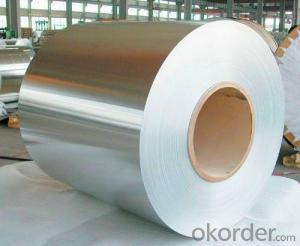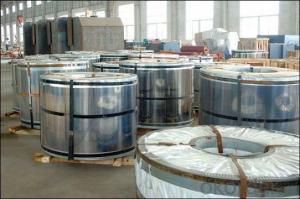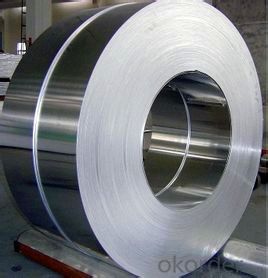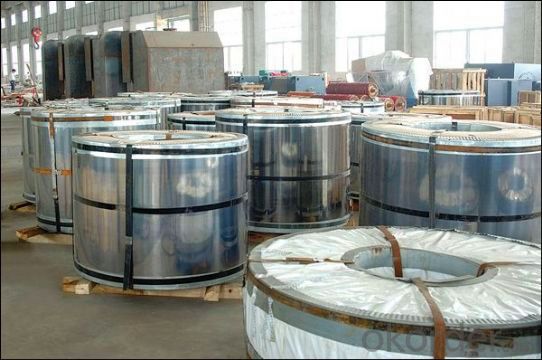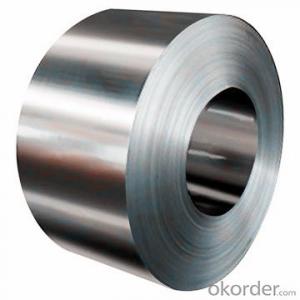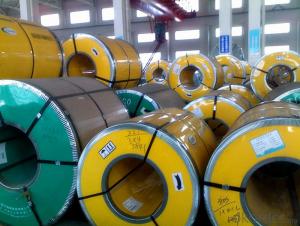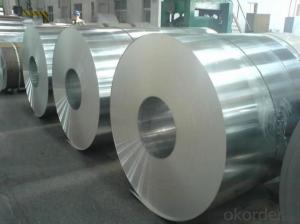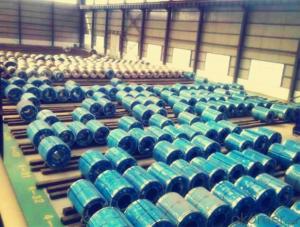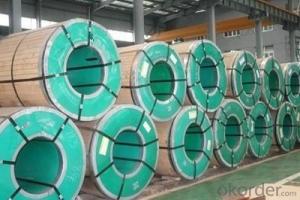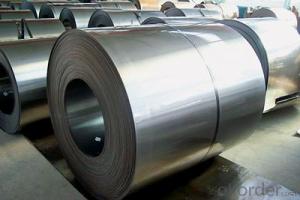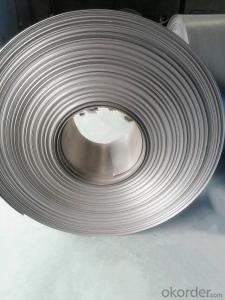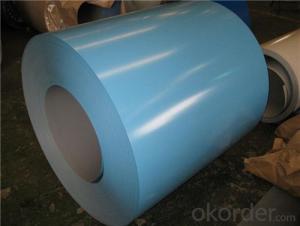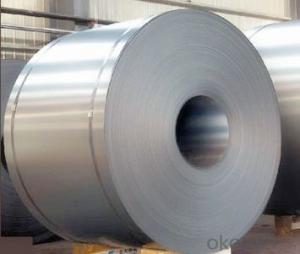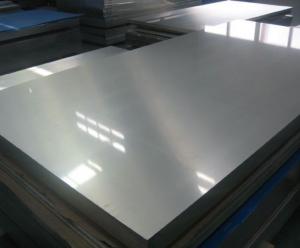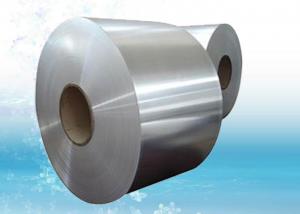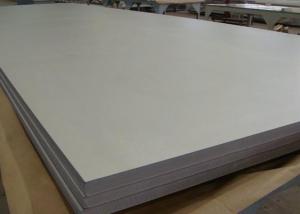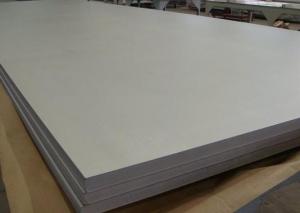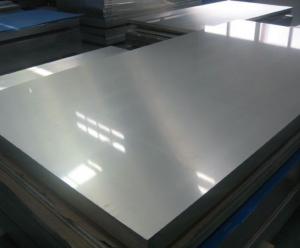201 SERIOUS COLD ROLLED STAINLESS STEEL COIL
- Loading Port:
- Guangzhou
- Payment Terms:
- TT OR LC
- Min Order Qty:
- 100 m.t.
- Supply Capability:
- 10000 m.t./month
OKorder Service Pledge
Quality Product, Order Online Tracking, Timely Delivery
OKorder Financial Service
Credit Rating, Credit Services, Credit Purchasing
You Might Also Like
Packaging & Delivery
| Packaging Detail: | 2b 201 stainless steel coil is packed in export standard package |
| Delivery Detail: | 2b 201 stainless steel coil finished within 15 days |
Specifications
1,2b 201 stainless steel coil thickness0.2~1.5mm
2.Ensure you quality timely delivery
3.2B finish
4.Tolerance 0.01mm
- Q: Are stainless steel strips resistant to nitric acid?
- Stainless steel strips are typically resistant to nitric acid. Renowned for its exceptional corrosion resistance, stainless steel shows commendable resilience against various acids, including nitric acid. Nevertheless, the degree of resistance may fluctuate based on the particular grade or alloy of stainless steel employed, alongside the nitric acid's concentration and temperature. It is highly advisable to seek guidance from the stainless steel manufacturer or supplier for precise details regarding their products' resistance to nitric acid in your specific application.
- Q: Are stainless steel strips suitable for storage tanks?
- Yes, stainless steel strips are suitable for storage tanks. Stainless steel is a highly durable and corrosion-resistant material, making it an ideal choice for storing various substances. It offers excellent resistance to rust, oxidation, and chemical reactions, ensuring the integrity of the stored materials. Stainless steel strips are also known for their strength and stability, providing structural support to storage tanks. Additionally, stainless steel is easy to clean and maintain, reducing the risk of contamination or degradation of the stored substances. Overall, stainless steel strips are a reliable and long-lasting solution for storage tanks in various industries such as food and beverage, pharmaceuticals, and chemical storage.
- Q: What are the common thickness tolerances for stainless steel strips?
- The common thickness tolerances for stainless steel strips can vary depending on the specific industry standards and requirements. However, in general, the common thickness tolerances for stainless steel strips range from ±0.0015 inches to ±0.005 inches. These tolerances ensure that the stainless steel strips meet the desired thickness specifications and maintain consistent quality throughout the manufacturing process. It is important to note that these tolerances may vary depending on the specific grade of stainless steel and the intended application of the strips. Manufacturers and customers often communicate and agree upon the specific tolerances needed to meet their unique requirements.
- Q: What are the common uses of stainless steel strips in the chemical filtration industry?
- Stainless steel strips are commonly used in the chemical filtration industry for various purposes such as structural support in filter systems, as filtration media for removing impurities from liquids or gases, as components in filter elements, and as screens or sieves for separating particles of different sizes. Their corrosion resistance, durability, and high temperature resistance make them ideal for handling corrosive chemicals and maintaining the efficiency of filtration processes in the industry.
- Q: How do stainless steel strips resist embrittlement?
- Stainless steel strips resist embrittlement due to their unique composition, which includes a high percentage of chromium. Chromium forms a protective oxide layer on the surface of the steel, preventing corrosive elements from penetrating and causing embrittlement. Additionally, the presence of other alloying elements like nickel and molybdenum further enhances the resistance to embrittlement by improving the steel's ability to withstand high temperatures and corrosive environments.
- Q: How do stainless steel strips compare to aluminum strips in terms of strength?
- Compared to aluminum strips, stainless steel strips generally possess higher strength. Stainless steel is renowned for its exceptional strength and durability, rendering it appropriate for diverse applications necessitating resistance to corrosion, heat, and impact. Conversely, aluminum strips exhibit relatively less strength; however, they are lightweight and boast commendable corrosion resistance. Although aluminum strips may not rival the strength of stainless steel, they are frequently favored in weight-sensitive industries like aerospace and automotive. Ultimately, the selection between stainless steel and aluminum strips hinges upon the precise requirements of the application, striking a balance between strength, weight, and other properties.
- Q: Are stainless steel strips resistant to magnetism?
- Generally, stainless steel strips do not resist magnetism. Although stainless steel itself is not magnetic, it can become magnetic through cold working or the presence of certain elements like nickel, manganese, or iron. These elements can form a magnetic or partially magnetic structure within the stainless steel, making it susceptible to magnetism. However, if the stainless steel strips have low levels of these magnetic elements or undergo annealing (heating and cooling) to remove their magnetic properties, they can be made non-magnetic. Overall, it's crucial to consider the precise composition and treatment of stainless steel strips in order to determine their magnetic properties.
- Q: Can stainless steel strips be used in architectural facades?
- Yes, stainless steel strips can be used in architectural facades. Stainless steel is a durable and versatile material that offers excellent resistance to corrosion, making it suitable for outdoor applications. Its sleek and modern appearance also adds aesthetic appeal to architectural designs.
- Q: What are the common uses of stainless steel strips in the petrochemical industry?
- Stainless steel strips are widely used in the petrochemical industry for various applications due to their exceptional qualities and characteristics. Some of the common uses of stainless steel strips in this industry are: 1. Heat exchangers: Stainless steel strips are often used to manufacture heat exchangers, which play a crucial role in petrochemical processes. The high corrosion resistance of stainless steel ensures the longevity and reliability of the heat exchangers, even in harsh operating conditions. 2. Storage tanks and vessels: Petrochemical plants require storage tanks and vessels to store various chemicals and substances. Stainless steel strips are commonly used to construct these tanks due to their excellent resistance to corrosion, chemical attacks, and high temperatures. 3. Piping systems: Stainless steel strips are preferred for fabricating piping systems in the petrochemical industry. These strips offer high strength, corrosion resistance, and the ability to withstand extreme temperatures, making them suitable for transporting corrosive and high-pressure fluids. 4. Reactors and pressure vessels: In the petrochemical industry, reactors and pressure vessels are used for various chemical reactions and processes. Stainless steel strips are extensively utilized in the construction of these critical equipment due to their durability, resistance to pitting and crevice corrosion, and ability to handle high pressures. 5. Flanges and fittings: Stainless steel strips are commonly employed in the production of flanges and fittings used in petrochemical plants. These components require materials that can withstand high-pressure environments and resist corrosion, making stainless steel strips an ideal choice. 6. Instrumentation and control systems: Stainless steel strips are also used in the manufacturing of instrumentation and control systems in the petrochemical industry. These strips provide excellent dimensional stability, resistance to temperature fluctuations, and resistance to chemical exposure, ensuring the accuracy and reliability of the control systems. Overall, stainless steel strips find extensive use in the petrochemical industry due to their superior corrosion resistance, high strength, heat resistance, and durability. These qualities make them indispensable for critical applications where reliability and longevity are crucial factors.
- Q: Can stainless steel strips be used for electrical conductivity?
- No, stainless steel strips are not typically used for electrical conductivity. While stainless steel does have some electrical conductivity, it is relatively low when compared to other metals such as copper or aluminum. Therefore, stainless steel strips are not commonly used for applications that require high electrical conductivity.
Send your message to us
201 SERIOUS COLD ROLLED STAINLESS STEEL COIL
- Loading Port:
- Guangzhou
- Payment Terms:
- TT OR LC
- Min Order Qty:
- 100 m.t.
- Supply Capability:
- 10000 m.t./month
OKorder Service Pledge
Quality Product, Order Online Tracking, Timely Delivery
OKorder Financial Service
Credit Rating, Credit Services, Credit Purchasing
Similar products
Hot products
Hot Searches
Related keywords
